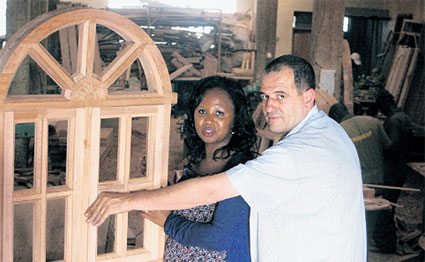Seated in their timber-yard office in Kitengela, Jane and Ian are the picture of a couple that gladly went into early retirement. Their team of 12 carpenters in the workshop next door carry on production.
Somewhere in the city, the other team of four is on site installing their products into clients’ houses.
Cross Cut is a Kitengela-based venture that makes interior wood products – doors, door and window frames, closets and curtain boxes. The owners of Cross Cut – Jane, 36, and Ian, 48 – are married with three kids.
The need for Cross Cut arose 10 years ago when the couple was building their home in Kitengela and were unable to find quality timber. The company started as JiMack in April 2005, and has grown to be known for its quality doors and arched window frames.
However, when Ian, a Germany-trained mechanical engineer with a hobby in hand-carving, got fewer contracts at his nine-to-five job at Toyota East Africa, Jane realised that the family needed a new stream of income to keep them afloat.
She and Ian decided to focus on turning Ian’s hobby into an income-generator for the family. They started by hiring out Ian’s hobby equipment to the home-builders in Kitengela.
When demand for their tools grew, the couple expanded their portfolio to source for their own timber and make products to sell. Demand kept growing, so they hired a timber-yard to make other high-quality wood products.
Ian is the technical director and head of design at Cross Cut – he sources for the timber from West Africa, cures it and creates the designs. He also manages and trains the team of carpenters and maintains the machines.
Jane handles the administrative, human resource and client-facing side of the business.
The couple maintained these roles and responsibilities for the five years they ran the business before they incorporated it as a company in 2008, a year after formalising their marriage.
The entire family holds a stake in the company– Ian holds 50 per cent, Jane holds 40 and five per cent each for two of their children.
Jane and Ian don’t pay themselves a salary: After all the business expenses have been settled, Jane puts aside what the family needs for the regular household into their joint bank account.
Whatever is left is our profit and more than half of this profit is reinvested into the business. One challenge the couple had to navigate as business partners is their clash of personalities: To their staff, Ian is the nice guy, while Jane is the harsh boss.
Ian is the spender, Jane is the penny-pincher. With a nostalgic laugh, Jane recalls a Christmas in December 2008 when Ian paid his staff a bonus without being aware that there would only be Sh2, 000 left for the family to spend during the holiday season.
To work around this challenge, Jane and Ian agreed that each would maintain the boundaries around their roles and responsibilities. And should there be an overlap, one consults with the other before a decision is made.
A constant and open line of communication for them both has also helped them work well together. “It doesn’t matter if you leave home in no mood to speak to each other, when you get to your shared office space, the business asks that you put that aside and talk,” says Jane.









